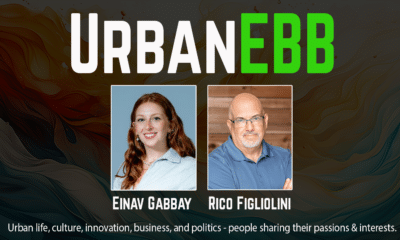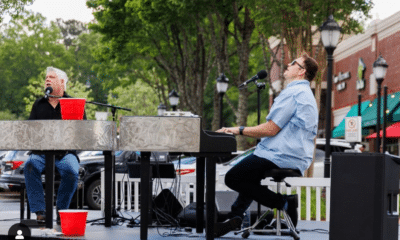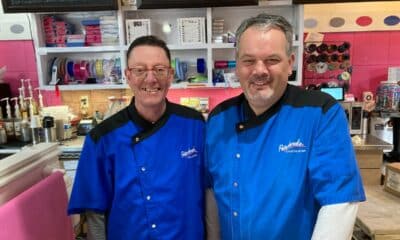Business
Capitalist Sage: How Business Mentorship Empowers Entrepreneurs, with Erin Igleheart [Podcast]
Published
5 years agoon
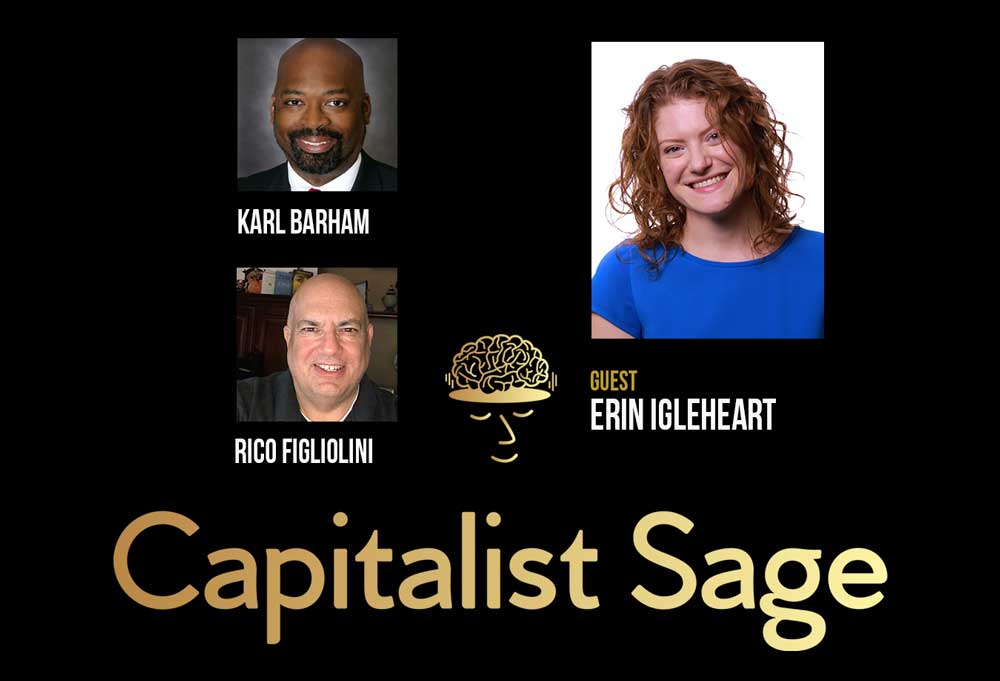
Have you ever had a business idea, wondered what tools you needed, or wanted to know how to just start? Join Rico Figliolini and Karl Barham as they interview Erin Igleheart, program manager with the Start Me accelerator program. Erin has experience and answers to all of the questions you may have about starting a business.
Resources: StartMeATL.org
Social Media: @StartMe
Podcast transcript – generated from voice recognition software.
Karl: [1:11] Welcome to the Capitalist Sage Podcast. We’re here to bring you advice and tips from seasoned pros and experts to help you improve your business. I’m Karl Barham with TransWorld business advisors. My co-host is Rico Figliolini with Mighty Rockets Digital Marketing and the publisher of the Peachtree Corner Magazine. Hey Rico, how’re you doing?
Rico: [1:27] Good. Good, Karl.
Karl: [1:28] Excellent. Why don’t we talk about our sponsors for today.
Rico: [1:32] Sure. Let’s give a shout out first to Atlanta Tech Park located here in Tech Park Atlanta, like the name switch, in the city of Peachtree Corners. Robin Bienfait and her innovative team is curating this place. Allowing accelerator startups and small companies to be able to grow in it. Phenomenal organized environment here that allows for workshops, seminars, all sorts of supportive groups that can take a small company to its success. So one of the podcasts from here is located in that place, and it’s a good place to be.
Karl: [2:11] Absolutely you could always stop by, check out its website; AtlantaTechPark.com check out upcoming events. You know in November, I think November 14th, is a tech showcase going on here from North Atlanta. Lots of events and you happen to be on the path of the shuttle, the driverless shuttle.
Rico: [2:28] Curiosity Lab of Peachtree Corners and Ollie the Driverless Vehicle. We just saw that before driving up and down as we were coming in.
Karl: [2:36] Absolutely. It’s a free shuttle, you have to get a ticket, a virtual ticket online and you’re able to ride that. So just a lot of really cool things happening in Peachtree Corners in the Atlanta Tech Park Village area. Well today, I’d like to welcome our today’s guest; Erin Ingleheart, program manager with the Start Me accelerator program and affiliated with the Emory University business school. Which is an outstanding program that helps local entrepreneurs help grow their business, learn some critical business skills, and help skills that help them to grow their business. How’re you doing today Erin?
Erin: [3:18] I’m great. Thank you so much for having me.
Karl: [3:21] Well, we’re here to talk today about business mentorship and how it could impact the community and in entrepreneurs that are starting businesses. One of the things that is amazing when you get into small communities, especially communities that may have more economic disadvantage, entrepreneurs are thriving in those areas. But the success rate could be a challenge there because they don’t have access to some of the critical things that companies, if you’re in Silicon Valley, there’s plenty of capital. There’s plenty of expertise, there’s network, there’s mentors. But in other communities they may not have those same resources as readily available. And so creating an ecosystem where that can thrive is really one of the missions of the Start Me accelerator program. I’d love to talk about that some more. So why don’t we tell,
start off by telling us a little bit about yourself and how did you get started in this passion of yours?
Erin: [4:20] That’s a great question. So Prior to joining Emory, my background was really all in private sectors. So I started out in banking at Morgan Stanley. I did a grad-degree in Silicon Valley and sort of saw some of that, a little bit of that divide if you will, in the support for entrepreneurs operating in the tech space particularly in that area. And perhaps some of the other small businesses that were struggling a little bit more to get started. I worked actually right around here and kind of proximate to Peachtree Corners for a start-up consulting firm for a few years and then switched over to the Social Enterprise Center at Emory just over three years ago where I was really looking to, kind of marry those business skills with more of a community focus and community impact component.
Karl: [5:07] So tell us a little bit about this social enterprise at Emory. What is that for folks that may not be familiar with that?
Erin: [5:13] That’s a great question. So it’s a research center within Emory Business School and the overarching focus is on making markets work for more people in more places in more ways. And we do that through research that several of our faculty members are doing. We do that through student coursework so several classes around social Enterprise and nonprofit management. And then we do that through fieldwork. And so we run a couple of different field work programs. Start Me in particular is focused on the Atlanta Community and several sort of historically under-resourced to communities in Metro Atlanta. But we also run the entrepreneurship database program, which is a large research study of accelerators and incubators around the world really looking at what works and what doesn’t in acceleration and incubation. So it’s the largest longitudinal study of those types of programs globally and then we also run a program that’s called Grounds for Empowerment that supports female coffee growers in Central America.
Rico: [6:16] So can I ask you, since you were out in the west coast like that, how’d you find that? I mean being a woman in the midst of, I guess stereotypical of what the research shows right now, it’s mostly men being there. How’d you find that working in a field like that in that environment? Erin: [6:33] That’s a good question. So I was in grad school while I was out there, so you’re in a little bit of a bubble as it is. And I really loved living out there but I didn’t necessarily get the bug, if you will, to stick around. I felt like I answered, a lot of times, the question of like why I didn’t have an app or why I didn’t have my own Tech startup. Which I respect as a path for entrepreneurs, absolutely, it just wasn’t a path that I was on. A conversation I felt like I sort of had over and over again. But I think what you see is so much passion in and around tech that it creates the, almost this bubble of enthusiasm and excitement that I really respect and enjoy and I think that it’s nice to be able to replicate that in other places that frankly are maybe more accessible to local populations if you will. So, you know, I think one challenge that we’re faced
with in Atlanta or any major city that has wonderful young people and wonderful entrepreneurs with tech ideas, that we don’t want to lose everybody to Silicon Valley. We want to create that same vibrancy and keep people in communities and the same is true for other types of businesses. You want to see that enthusiasm for all of your makers and bakers and fixers and doers. We’re operating in community.
Rico: [7:48] Which from what I understand isn’t really the type of company Silicon Valley wants to fund. They do want to fund the apps and the tech. And they don’t understand maybe the baker’s the makers and all the…
Karl: [7:59] You can’t eat an app.
Rico: [8:01] No you can’t. And it’s not sexy and it doesn’t provide the return in the short term that they want. It’s a lot different, you know. So coming into an area like Metro Atlanta where most of the startups are not necessarily tech startups. They’re mainly business things that we would normally eat drink and be merry with. But real different than in Silicon Valley.
Karl: [8:24] Yeah, absolutely. I mean, I’ve looked at data and studies shows. It’s probably somewhere north of 95 percent of businesses are not tech businesses. Your Main Street businesses, your neighborhood pizza shop, the person that fixes your car. These are the businesses that drive our economy and they’re found in every neighborhood. And these business leaders also are really important in the community that they’re in, they’re typically community leaders. They’re making sure that resources are being applied to problems. Their sense on the pulse of that area in there. It’s a great foundation for leaders and community, which is interesting. When you think of the program Start Me probably, describe what it is and in particular, I’m going to put you on the spot because you know part of the Emory School You got to tell me; what is the problem that Start Me is trying to solve?
Erin: [9:19] Yeah, absolutely. So it actually ties back to your question about the work that we do at Social Enterprises, so the program kind of originally grew out of research and so a lot of our fieldwork programs are kind of tied to research in that way. But one of my colleagues, Professor Peter Roberts, was really looking at what some of the differences are between communities with higher concentrations of poverty and lower concentrations of poverty across the United States. So kind of zip code by zip code. And one of the things that he found was that there really isn’t a market difference in the number of big businesses per capita, but there’s on average about a 26 percent gap in the number of micro businesses per capita. And so those are your local Moms and Pops. It’s your auto body shops, it’s your catering companies, it’s your local hair salons and natural hair care providers. And if you’re not finding those in and around your community, you’re finding them elsewhere. They’re not necessarily creating jobs. They’re not necessarily offering a gathering space for people who live there and they’re not attracting outside resources into the community. And so, you know, twenty-six percent gap for kind of an average population neighborhood would translate to 125 to 150 local small businesses. And so the program really originally grew out of that as we were looking at other cities or other neighborhoods around
Metro Atlanta that maybe aren’t necessarily served by the wonderful services you can get at Atlanta Tech Village or ATDC because they’re not necessarily as tech focused.
Rico: [10:50] So did you find the economic issue as part of that? I mean was there a correlation there as far as poor neighborhoods had a bigger gap?
Erin: [10:59] Poorer neighborhoods have that gap and so that’s where if you’re looking at high poverty residential neighborhoods, residential urban neighborhoods versus low poverty residential urban neighborhoods. What you’ll see is about a 26 percent gap and so, you know, you’re not seeing that gap in Midtown or Buckhead but you’re seeing that and in some of the neighborhoods that we operate in and then and also in many other neighborhoods in and around Metro Atlanta, and frankly cities across the United States. So this is not an Atlanta specific thing, but we particularly operate in those communities that are historically under-served, really trying to foster and build the businesses that are growing there that have a tide of those communities and that feed into that local economic and social vitality.
Rico: [11:45] So what can you do? What does the organization do that’s actionable that’s ground, that’s on the ground that you know… I mean, yeah, that’s on the ground accessory that you can say you can do this and within weeks or months, you’ll be at a better place.
Erin: [11:59] Yeah, and we try to do everything physically on the ground in the communities that we operate in. So we, Start Me as a 14 Session placed base accelerator program for small businesses. So we’re really focused on those micro businesses. Typically that’s one to five employees, including the founders, less than fifty thousand dollars in start-up capital. Oftentimes far less than fifty thousand dollars in start-up capital and you know, we’ve worked with everything from farmers to freight truckers to beer brewers to natural hair care providers. So it really runs the gambit of what you find in and around your neighborhood or what you might be looking for. If you’re a resident or an employee of a particular neighborhood. We run in three Metro Atlanta communities. We originally started in the Clarkston Community serving entrepreneurs and that economic corridor that also is kind of inclusive of Tucker and Stone Mountain. We also operate in the Economic Corridor of Edgewood Kirkwood and Eastlake and then the southside of Atlanta, which is a really large geography, south of I-20 ITP. But really try to support the entrepreneurs who live there, who work there, who provide valuable products and services to those communities. We deliver sessions in community. So we’re meeting at local schools from meeting at local community centers, and we’re really trying to bring an injection of business know-how, what do you need in order to effectively operate an early stage small business. Networks are really frankly that probably the most important piece of that and that’s peer entrepreneurs who are operating different businesses. But also going through a very similar entrepreneurial journey, all the ups and downs and kind of empowerment and challenges that that entails and having a network to draw upon there. And then we bring in with each cohort of 15 to 18 businesses, we bring in 20 to 25 volunteer business mentors from all walks of life, but with a lot of collective expertise and collective passion for small business who really work hand in hand with those entrepreneurs to build and grow businesses. And then each
Community has a peer selected capital component as well. So we have ten thousand dollars in grant funds for each community and the entrepreneurs and mentors peer select and allocate that capital over the course of the program.
Karl: [14:16] So one thing that you mentioned in each one, what is a typical session feel like? Give us a sense of.. what if I’m an entrepreneur and I show up in one of these what can I expect?
Erin: [14:27] That’s a good question. So, I mean it is an accelerator. It’s not a class and so we don’t want it ever to feel like, I read at people for three hours from a book or any of my colleagues do either. We open every session with dinner. It’s a great way to break bread with your neighbors, build connections with entrepreneurs and with mentors. We like to share some accelerated moments if you will and so that’s both the things that have gone really well in your business. That’s towards achieving major goals or milestones and then also the struggles. Things don’t always go well and sometimes it’s really hard to find a safe space to share that and we try to foster that safe space. We have a short curriculum component to every session and each one is a little different but you know, whether we’re introducing the key components of a business plan or walking through business financials, whatever that piece is, we try to keep that really short and then you spend the rest of the time applying it to the actual small businesses in the room. So entrepreneurs and mentors are working hand-in-hand to take those concepts and start to put that into place. So we want every business over the course of 14 sessions to exit of course with strong relationships and good networks, but also a short concise actionable business plan that they use and continue to build upon. We want them to have a good understanding of their financials. We want them to have really good comfort telling their business story to a wide variety of different stakeholders and to feel like coming out of an intensive and yet also very short 14 session roughly three month period of time that they kind of have that acceleration to their business and are kind of moving towards their strategic goals for where they want to take that business.
Rico: [16:09] This way they don’t feel alone out there on the prairie doing the work. And sometimes you feel alone. But yeah, just doing the work in a small business and sometimes you just gravitate to what you do best. I think you mentioned that. And you know to rejoin, you get stuck doing things maybe you shouldn’t be doing and other people should be doing and you have to grow that business.
Karl: [16:31] There’s a simple example of that that plays out. You take the financials and if you were to ask most small business owners, what’s your goal on profitability? And they’ll answer the question probably saying; make profit. But if they had to break that down and say well, where is that going to come from? How much? How much revenue do you need? What are the costs are going to have to do? They often don’t sit down and kind of put that on paper. But in a session where they’re putting that down on paper with peers, with other entrepreneurs as well as mentors, they start realizing; maybe I’m not charging enough to cover my costs. Now imagine not doing that math on paper before you actually go out there and start implementing it. By the
time you find out that you’re not, that the math isn’t working. You’re already in debt. You’re already struggling, you’re already frustrated. So you could avoid a lot of those things just by getting some of those ideas and said well, you know, maybe I can increase the price but can I lower the cost? Or my portion is this. If a simple caterer may do a delicious meal but you look at the portion that it can serve four people and most people aren’t going to eat four people’s worth of food. And so there’s a cost savings of maybe they only serve for two people. So that’s some of the exciting things that in the session you see people actually the light bulb going off and clicking and it’s just wonderful to see that.
Erin: [17:58] I think it also helps, again, to realize that you’re not alone. I would say the biggest fear that folks, and this is broad strokes, but that we see kind of coming into it as most folks are either afraid of standing up and talking about their business or they’re afraid of that financial session. You start to see people even been with well, I might be sick that week. You’re probably not sick that week, that’s in two months. And you know part of that is saying, is making it clear to them that they’re not by themselves. They’re not the only person who’s been kicking that can down the road and you do definitely get people who are like; so I’ve finally crunched the numbers and I’ve realized I’m losing X number of dollars on every single thing I sell, what do I do? And then you at least have something to act on and you can start to think about what the right lever is that you can tweak. But otherwise you’re just doing what you love and you don’t realize that it’s not necessarily working for you.
Rico: [18:54] Right, until it’s too late. The mentors that you bring out do they stay consistent with it? Do they sort of hook up with the individual entrepreneurs or startups? You know, are they in relation with them for a period of time? Or does it vary?
Erin: [19:09] So it’s a bit of both. So we work with the cohorts of about 15 to 18 businesses. 22-25 mentors and we have people rotate around for the first several weeks. And that’s so that everybody kind of gets a feel for the different businesses in the room, the different skill sets in the room, and trying to find a little bit of that art, if you will, of who clicks. And around week 4 we assign dedicated teams, and typically that’s about two businesses and about three mentors. And we try to really match people with those that they’ve clicked with. So you know, kind of expressed a particular interest in continuing to work with. But then also mentors that have a variety of different skill sets and so perhaps they have particular industry expertise that’s related to the businesses at their table. But otherwise trying to make sure that you know, we’re putting together folks who have experience with operations and marketing and communications and finance at the same table so that collectively they have that expertise that really serves the needs of the small businesses.
Karl: [20:08] And I would say it also extends beyond the room. It’s been about a couple of hours, 2 to 3 hours working on it, but then the phone calls after, midweek where, here’s my second iteration on my plan. Can you take a look at it? Or it could be an introduction to someone. Here is a retailer that might carry the product that I’m doing. They mentored me, have networks or people that they make those introduction they may bring them to events. So the role of the
mentor plays, is expands beyond just a session and years later, you will see the mentors. And even if you don’t directly work with them during the session, through the social events that happened you might connect with someone else that’s in another business and you might help them along a path as well.
Rico: [21:00] It’s all about networking.
Karl: [21:02] Yeah, it’s a critical component. I see it in a lot of successful businesses. You would think, you know, you have a better product and you execute, but the relationships you build, the people that could open doors. I heard the term the other day; the rich uncle. And most successful businesses, I thought it was a beautiful way of describing it, you might have someone that, I know a guy. You need printing material done in particular way, I know a guy. and when you’re a struggling entrepreneur and some of these communities you may not know that person that knows how to do that thing. And if you can get connected that can help you, you know, get over a hurdle that like.
Rico: [21:42] That’s funny, in New York we used to call it, it would be the rabbi. I had the rabbi. My rabbi tells me this, even though I’m a Catholic, doesn’t matter. Everyone has a rabbi.
Karl: [21:51] Everyone has someone that’s able to do that. So if someone was starting a business, you know early on, so your experience of working with all these entrepreneurs. Any tips and advice you’d give to someone that’s either thinking about starting a business or in that early stage of starting it? Any advice you’d give to those folks?
Erin: [22:12] That’s a great question, you know, we’re actually in the midst of the application cycle now, and so I’m meeting with lots of entrepreneurs who are thinking about starting businesses. Are currently operating businesses and looking for additional support that have been operating for a long time. So I’ve been having similar discussions and you know, I tailor it a little bit around what they want to do and where they are, but with a lot of folks it’s encouraging people to just start. Sometimes they’re waiting for the perfect moment, that exact perfect confluence of events. If you will, they want the perfect program the perfect partner, the perfect market conditions. And if you wait it might never happen. And if you know that you’re passionate about it, you just start and that way you at least can start doing it on your own time on your own terms and you can figure out what you’re looking for. Sometimes what you figure out is; you didn’t really need any of those things that you were waiting for in the first place. You know, there are tons of different resources out there both online and then in person. Lots of workshops to get people started, regardless of where they are, if they’re a serial entrepreneur and they’ve done this a bunch of times or this is the first time and they’re thinking about starting out on their own. There are so many different support programs out there and kind of resources that they can access.
Rico: [23:28] So you don’t have to feel alone.
Erin: [23:30] Exactly. You’re not alone.
Rico: [23:32] Right. You always ask about the bookkeeping or the money. I have this idea for an app or I have this idea for a clothing company. How do I get that process going? That could be scary. I mean, I love talking shop, but that could be scary to a young person not knowing what they’re doing.
Erin: [23:49] Yeah, and actually what’s interesting, you know, we run a program with High school students in the summertime and the younger people are less fearful in some ways. Like they come up with an idea and they’re like, I love it, I’m doing it, and I’m going to make this work. And I think sometimes there’s a little bit of that fear as you maybe get a little further on in your career. Or maybe even a little more afraid to put that idea out there with the risk that someone will say they don’t get it or they don’t like it. And maybe that person’s probably not your target audience.
Rico: [24:17] And that person could also be paying the bills and because they’re too far along in life, maybe. Where they’re thinking, I’ve just got to pay the bills.
Karl: [24:27] You even find very often, a lot of people that work for large corporations get trained on having all of the data. And having you know, a business plan that’s 40 pages with with all of that. And I’ve seen people that will write all of that stuff for years and they never start doing anything. So this concept of agile, being quick, fast fail. A business plan could be drafted on a piece of paper. There’s a couple of key questions you’ve got to answer. It doesn’t have to be complex, but it’s enough for you to examine the business model on what you’re trying to do and who your customers are and how you’re going to make money and how you’re going to find your customers to get you started and guess what’s going to happen. Even if you did a 40 page business plan, three months in guess what? The world changes, you’ve got to pivot, got to change. So it’s more dynamic.
Rico: [25:19] But doesn’t that, isn’t that a little different from how, I mean the world is funny. That’s my rent yet the bank wants to see a business plan. But then venture capitalists really want to see the passion, they don’t are about the business plan. They just want to see what you’re doing and they want to see proof of concept maybe. Or if it’s way before that, they just want to know that you’re really so into it that you can bleed it before you leave. Yeah, I mean so different ways.
Karl: [25:46] It is. But I’ll also say the the 40 page business plan can be a way to hide that you don’t know what’s important. If someone’s asking to invest money, whether it’s a bank lending you money. The people that do better can explain what their business is. They could explain who their customers are, they could explain how they’re going to make money out of it and what’s critical to success. And whether they do it on one page or a five minute pitch or they do it on a half hour or an hour long presentation and 40 pages. The essence of that, you gotta still answer those questions in there. And so for small businesses, if we’re talking micro-businesses,
you don’t need a 40 page business plan. You know to get started you need to, you need to think through some things, but it’s about taking action and being prepared to put yourself out there. There’s no illusion, every entrepreneur I think would tell you it’s a lot of hard work at the beginning but the passion carries them through a support network around them. A little bit of knowledge will carry them a pretty long way.
Erin: [26:55] And I think it’s okay to be comfortable with the fact that it’s not going to be perfect the first time. The first time you outline or draft your business plan. You’re going to get a bunch of things wrong, but you’ve got to make smart assumptions and figure out what you don’t yet know and then revisit it. And it’s a living document that will grow and change over time or you hope it grows and changes over time. But I think taking that first leap and putting some words down on paper goes a long way and then doubling back a little bit to what we were talking about before. You know, find a network, find people who have gone through a similar experience, who are micro business owners and in different industries or the same industry. And find mentors who can coach you and support you and are really just excited to see you thrive. And there are different ways that you can do that, whether you’re an extroverted person and you love to go to networking oriented events, or there are a lot of ways that you can do that work for more introverted individuals as well. But I think finding those people who are good sounding boards who don’t have as much of the emotional investment that you have and maybe can see past some of the flaws can be invaluable in helping you cultivate that early stage business idea.
Karl: [28:08] So I’m curious. This sounds, this is a great program and it’s out there for folks. But what if you’re in the business community and you know, you want to get involved. What are the ways that they can help their communities and/or get involved with this program?
Erin: [28:25] That’s a good question and there’s a couple of different ways that we sort of broadly engage different people. So one is in investing in local community programs. So that’s you know in supporting programs like ours that are free and support local small businesses in Metro Atlanta. But there are also other organizations and programs out there that are doing really important work. And in order to do that, you need financial resources in order to make that continue to work. You can also invest your time. I mean a big part of the value of what we bring together is bringing together networks of excited and engaged passionate people who are really passionate about supporting the entrepreneurs in the room. And so, so much of what we need is really good business skills, really good passion and you know, kind of that passion for helping others and asking the right questions. And you know, kind of supporting the growth and interests of others who are starting small businesses. And then the last thing is, you know, being a good community member yourself. You know, some of that is captured in small business Saturday, you know one day a year. But that is supporting your local businesses. That’s sourcing locally. That’s you know, finding local providers if you’re looking for a website or you’re looking for a wine shop or whatever it might be. And that doesn’t mean that everything you buy needs to be local, but you can find a lot of wonderful local businesses through business owners associations, by looking at the shops around you, by figuring out what the kinds of businesses that your neighbors are operating formally or informally out of their homes and supporting that.
Karl: [30:04] And you think about the holiday season is coming up and I know lots of people are going to be doing gifts for various reasons. Not only is it around Thanksgiving, the season for giving, there’s a lot of gifts that are being given. Supporting your local small business in these communities is a great way. If they wanted to learn, where they can find some of these businesses out there where they can purchase things and support in that way how do they find that?
Erin: [30:31] So we, on our own website keep a kind of a Shopping Guide if you will of our local small businesses. So we worked with about 200 businesses across Metro Atlanta and you know, they do everything. If you think about it, so, you know, some are offering the kinds of products and services that you might typically see around the holidays, so lots of different caterers. You know for after the holidays, we’ve got lots of folks that are focused on health and wellness and physical fitness. You know, we have folks who are doing lawn care and repair and help people get their homes ready with spring cleaning, you know for small business owners. We have those who work in, you know, digital media and build beautiful websites. So they kind of run the gambit. But you know, those are two hundred businesses that collectively are doing wonderful things in Atlanta, but you can also find lots of great businesses right around you, wherever you are. I mean looking around Peachtree Corner, there are corners, excuse me. There are so many right here that you’d be able to draw upon and that’s you know, walking into a local shop and asking. That’s you know, when something pops up in a social media news feed that’s a local business that’s checking it out. There are great festivals and events and Becraft experience is always a really fun one if you’re interested in makers and you know, kind of handmade and vintage products.
Rico: [31:54] And Johns Creek Festival just had, I think it was this past week. Lots of local makers there.
Erin: [32:01] Yeah Refuge Market over at Refuge coffee. And in Clarkston is a wonderful one and that’s a lot of new Americans and refugees that are building and selling beautiful products and a lot of times those are really fun things to pick out for others. I’m not necessarily much of a shopper myself, but I love shopping for other people and I think it’s really fun to find something that looks like it would be really special to a parent or significant other or a child. And feel like I put a lot of thought and energy into selecting something for them.
Rico: [32:32] It’s always nice to find something different rather than going for the same product at the same three stores that’s mass produced.
Karl: [32:38] And there’s often a story behind it. When you see a lot of these products, where it was made, how it was made, the traditions or culture that’s built into it is also a great way to get. And what if somebody wanted to be a mentor, how do they get involved in that process?
Erin: [32:53] That’s a great question. So we do engage a lot of mentors. We have about 80 volunteer mentors across our three programs. Our programs largely run from January through the very beginning of April. And so what we really have mentors do is they’re there week in and week out meeting and working with entrepreneurs. So it’s a very much a Hands-On role. And then throughout the rest of the year we do other programming. You had mentioned some of the social activities. We do also mentor office hours for mentors continue to kind of plug-in. So we do try to continue to foster that network. Folks can really find a lot of that information on our website. So we’re at StartMeATL.org there is a mentor tab for under a kind of get involved and you know who we’re working with but you know, we work with business professionals from across Metro Atlanta with a wide variety of different skill sets. Entrepreneurs often times make fantastic mentors, they get what it’s like to work on a business and in a business and balancing wearing all of the hats with also everything else going on in and around their lives.
Rico: [33:54] And if people aren’t ready yet they can go to Facebook or Instagram for Start Me ATL.
Erin: [33:59] Exactly, yeah. We’re all over our social media as well. That’s where you can certainly also find out about local small businesses to shop. But we can all, you can also find out about ways to continue to engage and I think it’s a fun way to put your business skills to work in supporting other individuals. And you know, I find it to be really rewarding to be there week in and week out. But it’s really fascinating to see how much ground you can cover in a small business and how much excitement people have coming out of a 14 session accelerator for you know what the months and years after that hold.
Karl: [34:37] So the website is StartMeATL.org. If you want to find out more information about the Start Me program fine, and I know there’s a deadline coming up soon for entrepreneurs people that are looking. When are applications due Erin?
Erin: [34:54] They’re due this weekend. So it’s an exciting stretch for us. Yeah, we’re approaching the very end of our application cycle for entrepreneurs interested in going through the program come January. So we’re open through October 20th, and then all applications go through a detailed paper review. We do a selection night and from all the applications were selecting 15 to 18 businesses per cohort and then we’re running also all those cohorts in parallel. So we’ve got, we’re in Eastlake on Tuesdays, Clarkston on Wednesdays and the Southside on Thursdays working with entrepreneurs, you know, kind of night after night after night to build those businesses.
Rico: [35:30] If they miss the 20th and the sessions start in January is there another set of sessions later in the year next year?
Erin: [35:38] That’s our next set of sessions for kind of accelerator for this particular program. We do also keep a really detailed resources page. So we think, not only is it important to support entrepreneurs through our program but really important to connect people to other
resources in and around Metro Atlanta and then also online. So we keep a running calendar of upcoming events that we think are really helpful to small businesses. And then we have links to the different organizations that are doing really important work in these different communities. Whether it’s for those who are just trying to decide if entrepreneurship is a good fit, to those who are operating really established businesses and just looking for that support system as they’re kind of taking the next step in scaling or expanding or even thinking about selling.
Karl: [36:25] Well, I want to thank you so much Erin for joining us today. Erin Is programmatically with Start Me and works at Emory University business school. You shared a lot of information, a lot of insight for people. And I don’t know if people realize how much is going out there in the community. And just being aware that there’s resources available for people to be entrepreneurs. And it’s not always have to be a big tech idea. It could be as simple as a micro business that is being grown and there’s support there for that. We’d also like to thank Atlanta Tech Park for hosting The Capitalist Sage podcast. We’re here every month and get to talk with folks and have a great conversation about business. Great place to work, great environment to follow your entrepreneurial pursuits as they come through. Rico, what do we have coming up?
Rico: [37:28] There’s so much going on. I just don’t know where to start sometimes. But so let me hold this up. The Peachtree Corners magazine, yes, this is one of the jobs that I do, I own this magazine. It’s a great magazine I think, I’m hoping everyone enjoys it. It comes out six times a year. The next issue is December/January. If you have someone under 20 that you want to nominate to our first 20 under 20 issue list, that would be great. It has to live in Peachtree Corners Middle School to High School, college. Someone that has had either an impact on the community or success with their own within their own lives. Whether it’s sports or writing, performing, sciences. That’s who we’re looking for. Someone, an individual young person that would inspire others is essentially what we want. So that’ll be the next issue. Deadline for that is October 31st. Visit our Facebook page, Instagram, or come to LivingInPeachtreeCorners.com and you’ll find the page with information there. Aside from that I also do social media marketing, I do other things I’m in the middle of a product video I’m doing for a client. And the first time I’m ever doing stop-motion animation in my garage. I’ve set up the studio and it’s a learning experience, but it’s cool because you get, even at my age, you get to learn a lot of stuff that you haven’t done before.
Karl: [38:52] Oh, fabulous. Well, I’m Karl Barham with TransWorld business advisors of Atlanta Peachtree. We help entrepreneurs at any stage, whether they’re looking to find a business, to acquisition, where they’re looking to exit their business and sell their business. We help them with that but where our passion is around, is really supporting the entrepreneurial, the small business community here in the Metro Atlanta area. You could find out more about our process and what we do at www.TWorld.com/Atlantapeachtree and just reach out if you’re thinking of becoming an entrepreneur, I’d love to have a conversation with you and help you start planning for it. And if you’re been in business for a while and you’re looking for your next adventure, there’s plenty, it’s a good time to find the next leader of your business and we can help you with
that as well. Again, thank you Erin for joining us today. And we want to thank everybody out there for listening to this podcast and following us on Facebook, Twitter, Instagram, YouTube.
Rico: [40:01] You can listen to the YouTube Video from this which is well, when I post it. Or you can get the podcast on iHeart, Spotify, Boxcasts, SoundCloud, anywhere, iTunes. Anyway, you can find it.
Karl: [40:14] And LivingInPeachtreeCorners as well.
Rico: [40:16] LivingInPeachtreeCorners.com.
Karl: [40:18] .com. Absolutely. Well, thank you everybody. Have a great day.
Rico: [40:21] Thank you.
Related
Business
BRACK: Peachtree Corners to lose Peterbrooke Chocolatier
Published
5 days agoon
April 19, 2024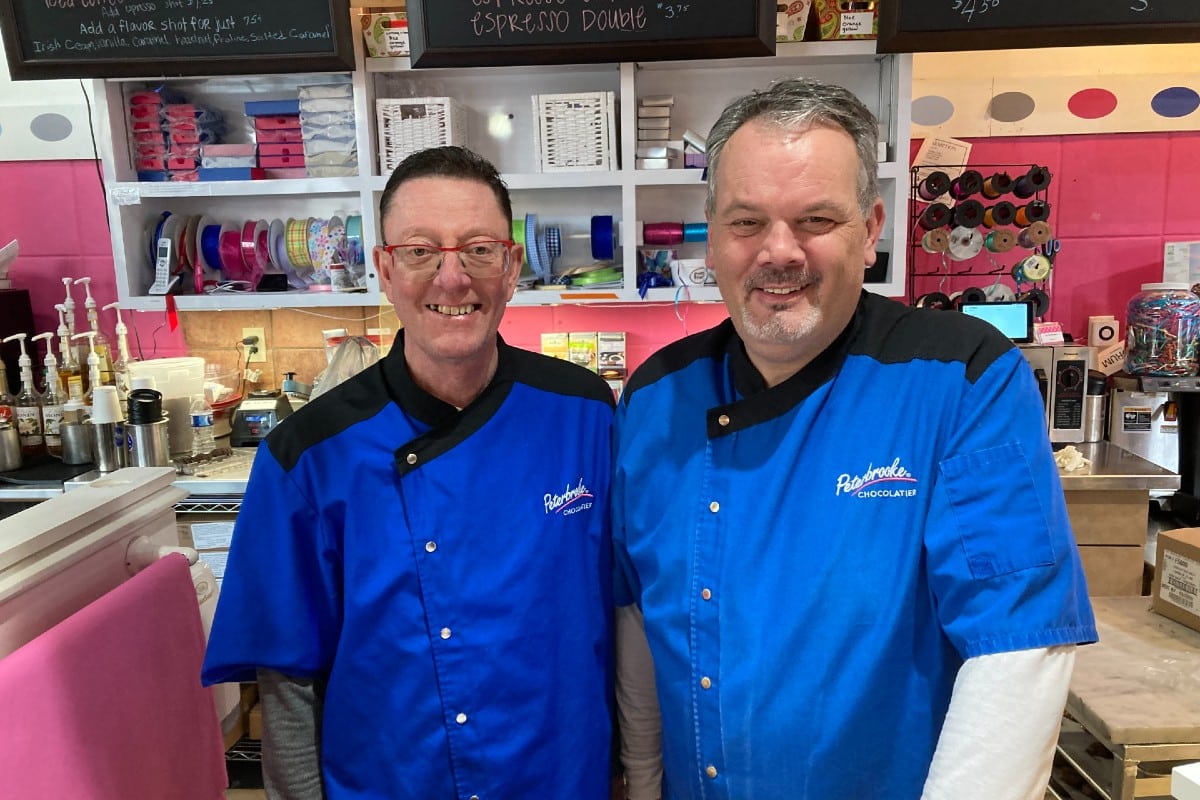
Peachtree Corners will soon lose one of its most iconic, popular and tasty businesses.
Peterbrooke Chocolatier, run by Geoffrey Wilson and Scott Gottuso, has been told by Peachtree Forum landlords, North American Properties and Nuveen Real Estate, that its lease will not be renewed. The last day of business will be July 25.
Meanwhile, Peachtree Forum is getting several new stores. They include Kendra Scott, Sucre, and The NOW Massage. Previously announced were Alloy Personal Training, Cookie Fix, Gallery Anderson Smith, Giulia, Lovesac, Nando’s Peri-Peri and Stretchlab. Wilson adds: “We are not in their big picture.”
Wilson has operated Peterbrooke at the Peachtree Forum for 14 years and Gottuso has been there nine years. They have made the chocolatier profitable and doubled sales. Wilson says: “We turned it around through community involvement and made relationships. We worked with the schools, gave donations, did a lot in the community, and made a difference. We produce most everything we sell in the shop, so it’s labor intensive. We make European-style chocolate treats from scratch from the very best ingredients, package it, make gift baskets, and also sell a lot of gelato.”
Key items include truffles, hand-made caramels, cherry cordials, chocolate-covered cookies and pretzels and strawberries hand-dipped in their own blend of chocolates. (They are all good!) One of Wilson’s and Gottuso’s most iconic products is chocolate popcorn. Once you try it, regular popcorn is tasteless. “We sell a lot of it.” Wilson adds: “Gelato sales have carried us in the summertime, since there are not many chocolate holidays in the summer.”
Peterbrooke now has five employees, and would like to have 10, but it is difficult to hire people with the skills in chocolatiering. A key part of its business is corporate companies, such as Delta Air Lines and Capital Insight. The Peachtree Corners’ Peterbrooke has corporate customers as far away as Cleveland, Ohio.
The operators were surprised when the Forum owners did not renew its five year lease. “The big decisions were made in Charlotte or Cincinnati, not locally,” Wilson feels. “We were no longer in their big picture. They want new and glitzy, shiny, fancy and trendy.”
The operators plan to start their own chocolate company, to be called “Scoffrey,” and initially sell online, plus have pop-up locations during holidays, and possibly have a booth in other merchants’ stores on occasions.
“Whatever we do would look different. We might rent a space somewhere close by so that people can still have the good chocolate experience with us, but we won’t have a regular audience walking by.”
Another element: the price of chocolate futures has spiked this year, with a bad crop production year. Wilson says: “That is key to our business and a huge cost increase. That doesn’t help.”
Wilson adds that the forced closing of the Peterbrooke location “is something like the death of a friend. But you go to the funeral and to the wake, and in six months or a year, It won’t be so bad.”
Have a comment? Send to: elliott@elliottbrack
Written by Elliott Brack
This material is presented with permission from Elliott Brack’s GwinnettForum, an online site published Tuesdays and Fridays. To become better informed about Gwinnett, subscribe (at no cost) at GwinnettForum
Related
Business
North American Properties Revitalizes Avenue East Cobb
Published
1 week agoon
April 16, 2024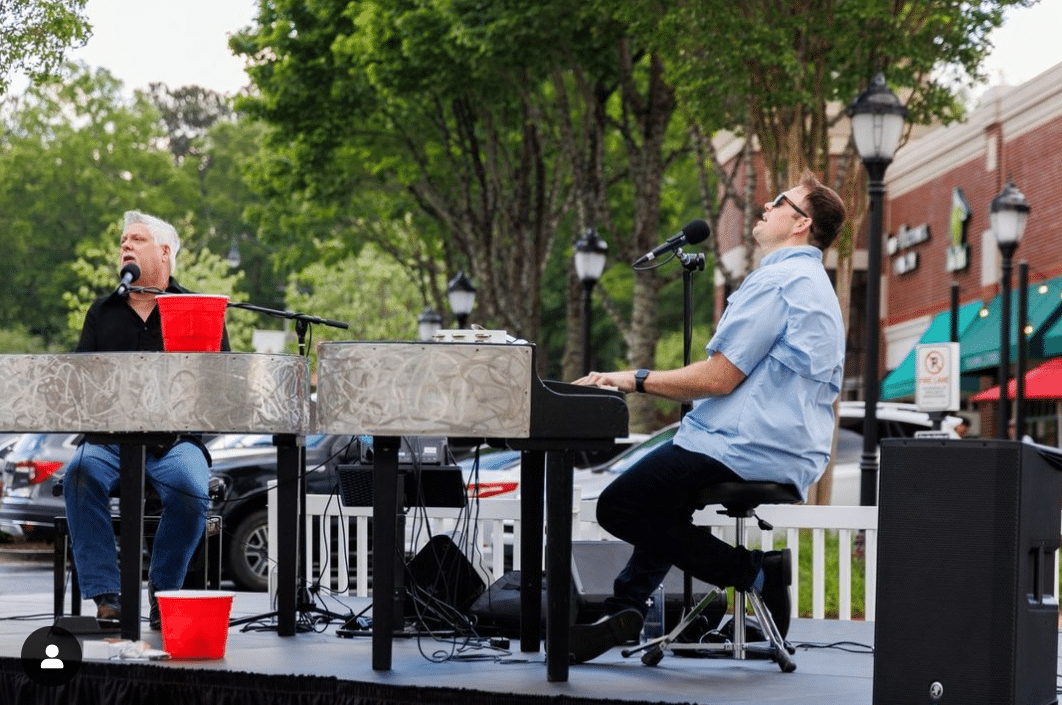
North American Properties (NAP) has revamped the Avenue East Cobb shopping center in Marietta, boosting its appeal to suburban residents seeking a more urban lifestyle. Now, it’s being honored as part of the Atlanta Business Chronicle‘s “Best in Atlanta Real Estate” coverage.
NAP is known for transforming properties like Atlantic Station, Colony Square and The Forum.
According to the Atlanta Business Chronicle, the redevelopment involved demolishing part of the main building to build a public plaza with a stage surrounded by restaurant patios.
A new concierge facility was also added, including a canopy for drop-offs. Additionally, smaller retail buildings were created for standalone tenants. The business mix was updated to include names like Warby Parker, Lululemon and Peach State Pizza.
NAP also increased community engagement by partnering with at least 10 local organizations for social events. These efforts have proven successful. Over the last two years, Avenue East Cobb has seen a 36% increase in sales per square foot thanks to a major rise in foot traffic.
More news from North American Properties can be found here.
Related
Business
North American Properties Secures 3 New Brands for The Forum
Published
2 weeks agoon
April 11, 2024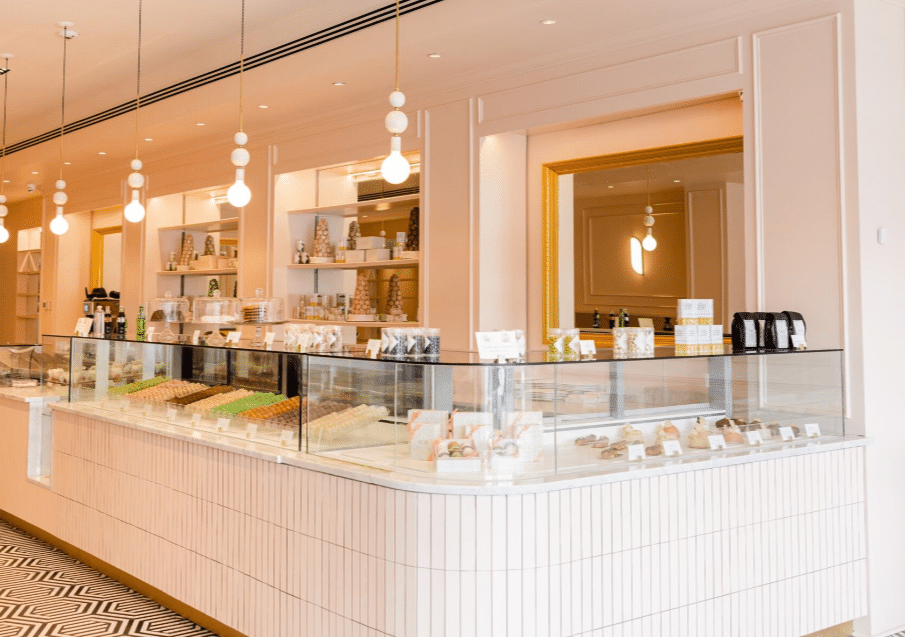
North American Properties (NAP) and Nuveen Real Estate announced three new businesses coming to The Forum Peachtree Corners (The Forum). The new brands include Kendra Scott, Sucré, and The NOW Massage.
“We’re excited to keep expanding our merchandising mix with more experiential concepts that motivate guests to extend their time on property. In addition to these new leases, several tenants are on track to open over the next few months, and we can’t wait to see the impact,” said Brooke Massey, director of leasing at NAP.
Here are the latest deals to be signed at The Forum:
Kendra Scott – Known for its plethora of accessories and customizable Color Bar experience, jewelry brand Kendra Scott blends classic designs with modern sophistication. Kendra Scott jewelry celebrates individuality and self-expression.
The growing brand has also donated over $50 million to local, national and international causes since its launch in 2010. The 2,284-square-foot space, situated next to Lovesac, opens later this spring, marking the retailer’s fourth location in the NAP portfolio.

Sucré – Founded in New Orleans, Sucré is a gourmet patisserie known for its macarons, gelato and other handmade, French-inspired desserts.
The sweet boutique will occupy a 1,718-square-foot space on the north end of the property and is slated to open later this year. Georgia is the brand’s first out-of-state venture, with The Forum being its third metro Atlanta location and eighth overall.
The NOW Massage – This brand is helping people discover the healing benefits of massage therapy.
The customizable menu offers guests three signature massage styles and a variety of exclusive enhancements like Deep Tissue, Herbal Heat Therapy, Hemp Calm Balm, Gua Sha, Gliding Cupping and more. Located near Mojito’s, the 2,414-square-foot massage boutique debuts late summer.
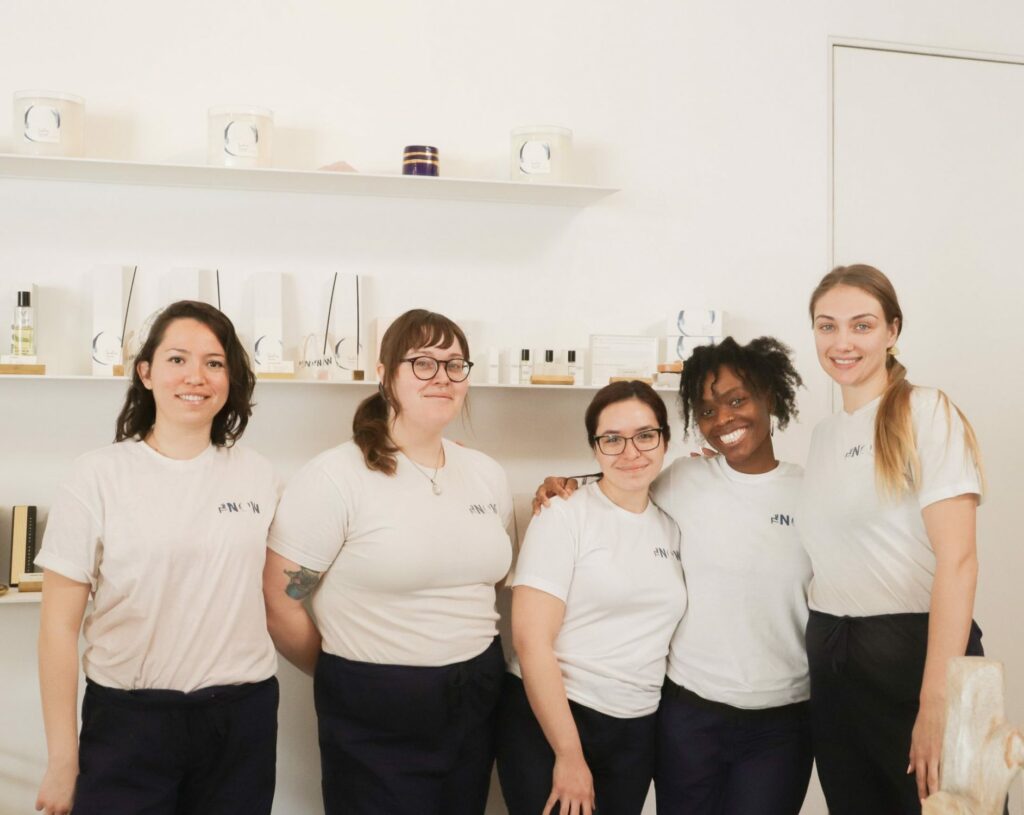
These businesses join:
Alloy Personal Training (opening this month),
Cookie Fix (open),
Gallery Anderson Smith (opening this month),
Giulia (opening this spring),
Lovesac (open),
Nando’s Peri-Peri (coming winter 2024), and
Stretchlab (open).
Since acquiring the property in March 2022, NAP has executed 39 deals with new, existing and temporary tenants alike.
To stay up to date on the latest happenings at The Forum, follow on Facebook, Instagram, and X or visit theforumpeachtree.com.
Related
Read the Digital Edition
Subscribe
Keep Up With Peachtree Corners News
Join our mailing list to receive the latest news and updates from our team.
You have Successfully Subscribed!

North American Properties Secures 3 New Brands for The Forum

Exploring Israeli Innovation in the Smart City Sector with Einav Gabbay [Podcast]

Georgia United Methodist Foundation Announces Changes to Finance Team

North American Properties Revitalizes Avenue East Cobb

BRACK: Peachtree Corners to lose Peterbrooke Chocolatier

Spring Voting Will Determine Important School Board Elections

Local Non-profit Boy With a Ball Announces Dates for Upcoming Conference

Local Non-profit Boy With a Ball Announces Dates for Upcoming Conference

Spring Voting Will Determine Important School Board Elections

BRACK: Peachtree Corners to lose Peterbrooke Chocolatier

Georgia United Methodist Foundation Announces Changes to Finance Team

North American Properties Revitalizes Avenue East Cobb

Exploring Israeli Innovation in the Smart City Sector with Einav Gabbay [Podcast]

North American Properties Secures 3 New Brands for The Forum

April/May Events Going on at Gwinnett County Parks

Light up the Corners [Video]

Capitalist Sage: Business Leadership in Your Community [Podcast]

Cliff Bramble: A Culinary Adventure through Italy

Top 10 Brunch Places in Gwinnett County

A Hunger for Hospitality

THE CORNERS EPISODE 3 – BLAXICAN PART 1

Top 10 Indoor Things To Do This Winter

The ED Hour: What it takes to Remove Barriers from Education
Peachtree Corners Life
Topics and Categories
Trending
-
Podcast1 week ago
Exploring Israeli Innovation in the Smart City Sector with Einav Gabbay [Podcast]
-
Faith1 week ago
Georgia United Methodist Foundation Announces Changes to Finance Team
-
Business1 week ago
North American Properties Revitalizes Avenue East Cobb
-
Business5 days ago
BRACK: Peachtree Corners to lose Peterbrooke Chocolatier









